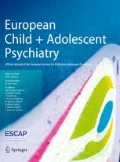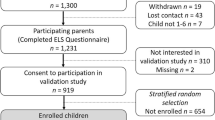Abstract
The parental questionnaire FTF (Five to Fifteen) was given to parents of 76 children (mean age 11 years) diagnosed with ADHD. About half of the children had at least once been referred to a speech- and language pathologist. Most of them had not received any intervention or follow-up. A factor analysis identified six problem areas, which explain close to 75% of the total variation: Cognitive Skills, Motor/Perception, Emotion/Socialisation/Behaviour, Attention, Literacy Skills and Activity Control. The majority of the children had pragmatic problems, which are associated with some of the core aspects of the ADHD symptoms, especially inattention and impulsiveness. Communication and language comprehension caused these children many more problems than expressive language. Problems of reading and writing were very frequent. IQ-score was associated with maths and reading/writing. Additional items reflecting language skills, in particular language comprehension and pragmatics, were also found in other domains in the FTF, mainly in Executive functions, Learning and Social skills. Problems with language and pragmatics thus seem to be associated with the typical problems with learning and social skills in children with ADHD.
Similar content being viewed by others
References
American Psychiatric Association (1994) Diagnostic and Statistical Manual of Mental Disorders. Washington DC
Barkley RA (1997) ADHD and the Nature of Self-Control. The Guilford Press, New York
Beitchman JH, Brownlie EB, Inglis A, Wild J, Ferguson B, Schachter D, Lancee W, Wilson B, Mathews R (1996) Seven-year follow-up of speech/language impaired and control children: psychiatric outcome. J Child Psychol Psychiatry 37(8):961–970
Bishop DV (2000) Pragmatic Language Impairment. A Correlate of SLI, a Distinct Subgroup, or Part of the Autistic Continuum? In: Bishop DV, Leonard L (eds) Speech and Language Impairment in Children. Causes, Characteristics, Intervention and Outcome. Hove, UK, Psychology Press, pp 99–113
Bishop DVM, Rosenbloom L (1987) Childhood language disorders, classification and overview. In: Yule W, Rutter M (eds) Language Development and Disorder. Cambridge, UK, Cambridge University Press, pp 16–41
Cantwell DP, Baker L (1991) Psychiatric and Developmental Disorders in Children with Communication Disorder. American Psychiatric Press, Washington DC
Cohen N, Menna R, Vallance DD, Barwick M, Im N, Horodezky NB (1998) Language, Social Cognitive Processing and Behavioral Characteristics of Psychiatrically Disturbed Children with Previously Identified and Unsuspected Language Impairments. J Psychol Psychiatry 39:6:865–877
Cohen NJ, Barwick MA, Horodezky NB, Vallance DD, Im N (1998) Language, Achievement, and Cognitive Processing in Psychiatrically Disturbed Children with Previously identified and Unsuspected Language Impairments. J Child Psychol Psychiatry 39:6:865–877
Cohen NJ, Vallance DD, Barwick M, Im N, Menna R, Horodezky NB, Isaacson L (2000) The interface between ADHD and language impairment: an examination of language, achievement, and cognitive processing. J Child Psychol Psychiatry 41:3:353–362
Fujiki M, Brinton B (1994) Social Competence and Language Impairment in Children. In: Watkins R, Rice M (eds) Specific language impairments in children. Baltimore ML, Paul H Brookes, pp 123–143
Gathercole SE, Baddeley AD (1993) Phonological working memory: A critical building block for the reading development and vocabulary acquisition? Eur J Psychol Education 8:259–272
Heyer J (1995) The responsibilities of speech-language pathologists toward children with ADHD. Semin Speech Lang 16:4:275–288
Humphries T, Koltun H, Malone M, Roberts W (1994) Teacher-identified oral language difficulties among boys with attention problems. J Dev Behav Pediatr 15:2:92–98
Kadesjö B, Gillberg C (2001) The comorbidity of ADHD in the general population of Swedish school-age children. J Child Psychol Psychiatry 42(4):487–492
Kadesjö B, Janols L.-O, Korkman M, Mickelsson K, Strand G, Trillingsgaard A, Gillberg C (2004) The FTF (Five to Fifteen): the development of a parent questionnaire for the assessment of ADHD and comorbid conditions. Eur Child Adolesc Psychiatry 13:3:3–13
Leonard LB (1998) Children with Specific Language Impairment. The MIT Press, Cambridge, Massachusetts, London, England
Nie NH, Hull CH, Jenkins JG, Steinbrenner K, Bent DH (1975) SPSS: Statistical Package for the Social Sciences. New York
Norrelgen F, Lacerda F, Forssberg H (1999) Speech discrimination and phonological working memory in children with ADHD. Dev Med Child Neurol 41:5:335–339
Oram J, Fine J, Okamoto C, Tannock R (1999) Assessing the Language of Children With Attention Deficit Hyperactivity Disorder. Am J Speech Lang Pathol 8:72–80
Ors M (2003) Specific Language Impairment. Neurophysiological studies of children and parents. Doctoral dissertation Lund, Department of Clinical Neuroscience, Division of Clinical Neurophysiology, Lund University
Rapin I, Allen D (1983) Developmental language disorders: Nosologic considerations. In: Kirk U (ed) Neuropsychology of language, reading and spelling. New York, Academic Press, pp 155–184
Sahlén B, Nettelbladt U (1995) How specific is specific language impairment? On problems of delineation and classification. Scand J Logopedics and Phoniatrics 20:51–60
Szatmari P, Offord DR, Boyle MH (1989) Correlates, associated impairments, and patterns of service utilization of children with attention deficit disorder: Findings from the Ontario child health study. J Child Psychol Psychiatry 30:205–217
Tannock R (2002) Language, Reading, and Motor Control Problems in ADHD. A potential Behavioral Phenotype. In: Greenhill LL (ed) Learning Disabilities, Implications for Psychiatric Treatment. Washington, DC, London, England, American Psychiatric Press Inc
Tirosh E, Cohen A (1998) Language deficit with attention-deficit disorder: a prevalent comorbidity. J Child Neurol 13:10:493–497
Trillingsgaard A, Damm D, Sommer S, Jepsen J, Richardt M, Østergaard O, Frydenberg M, Thomsen PH (2004) Developmental profiles on the basis of the FTF (Five to Fifteen) questionnaire. European Child and Adolescent Psychiatry 13:3:iii39–iii49
Westby C, Cutler S (1994) Language and ADHD: Understanding the bases and treatment of self-regulatory deficits. Topics in Language Disorders 14(4):58–76
Westerlund M, Bergkvist L, Lagerberg D, Sundelin C (2002) Comorbidity in children with severe developmental disability. Acta Paediatr 91:529–534
Author information
Authors and Affiliations
Corresponding author
Rights and permissions
About this article
Cite this article
Bruce, B., Thernlund, G. & Nettelbladt, U. ADHD and language impairment. Europ.Child & Adolescent Psych 15, 52–60 (2006). https://doi.org/10.1007/s00787-006-0508-9
Accepted:
Issue Date:
DOI: https://doi.org/10.1007/s00787-006-0508-9




